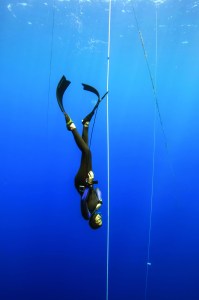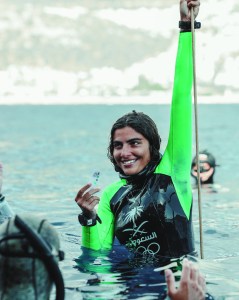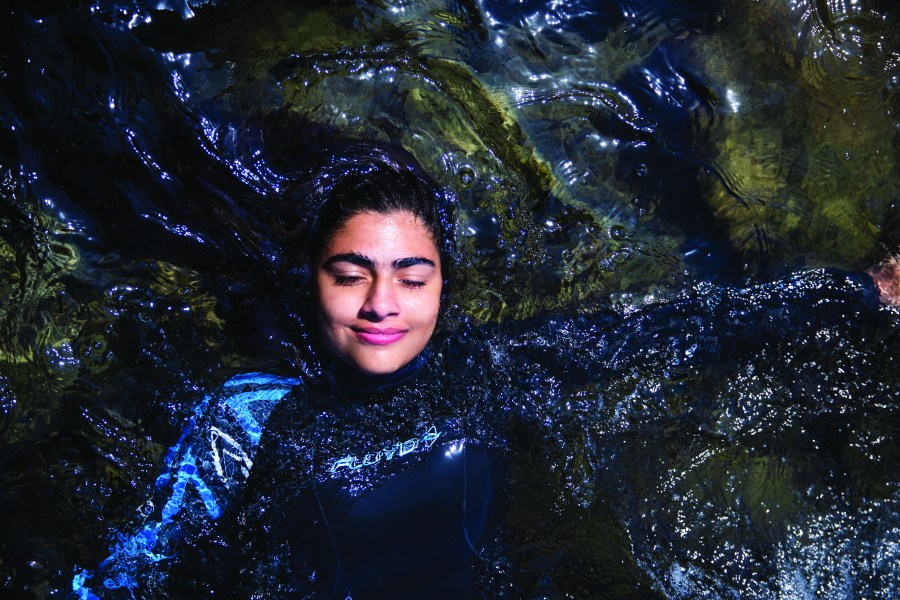Saudi Arabian freediver Salma Ahmed Shaker has got closer to the seabed than any other woman in the GCC. Here the nine-times national record holder talks to Eve Boggenpoel about the joys and challenges of exploring the depths of the ocean.
Salma Ahmed Shaker on her freediving journey
‘Growing up in Jeddah, I’ve always been drawn to the sea. My parents were both lovers of the ocean – my father not only studied marine geology, he was also an accomplished scuba diver, captain and fisherman.
‘I first tried scuba diving when I was 10 years old and absolutely loved it. Fast forward to the age of 19, and I discovered freediving, finding it both challenging and immensely liberating – so much so that I entered my first competition just one week after finishing my first deep-sea diving course (the addiction started after that!).
‘I’m lucky enough to have access to some of the most beautiful dive locations in the Red Sea, where I not only get to practise but also to explore its beauty. In fact, it was only when I visited other diving locations that I really came to appreciate what makes it so special. What truly captivates me are the mesmerising coral formations. Saudi’s Red Sea is surrounded by the world’s fourth-largest barrier reef and spans more than 28,000 sq km, with an archipelago of more than 90 untouched islands. The marine life is spectacular, too. Once, when I visited the Georgios G shipwreck off the coastal city of Tabuk, I spotted a huge silhouette to my left and realised it was an enormous whale shark, which I swam with for nearly 45 minutes!
‘When I first started freediving, I didn’t realise how much of a mental sport it is. I used to feel frustrated because I would feel like my body was ready to do a specific dive but my mind wasn’t. I realised I didn’t just need to train physically but, more importantly, I had to train mentally, too, so I could deal with the pressure of the challenge and constant battle with my mind as I pushed the limits of my abilities.
Salma Ahmed Shaker on mental wellbeing
‘Maintaining my mental clarity is essential for peak performance, to keep me focused. Developing techniques such as mindfulness and visualisation helps me cultivate a strong mental game and keeps me grounded during competitions. I also have to navigate my way around the anxiety I feel around the pressure to succeed. The fear of failure is high, especially when competing against top athletes and striving to meet personal expectations. Winning brings its own range of emotions, from euphoria, relief and a profound sense of accomplishment, but freediving transcends mere record-setting; it’s a real journey into the depths of human capability.

‘A big part of freediving training is meditation, specifically imagery meditation. It was a challenge at the beginning, but now freediving helps me understand my mind and body much more and what it needs. Managing the fear of the unknown is a profound aspect of freediving. Descending into the ocean can awaken feelings of vulnerability and apprehension, and overcoming this fear demands trust in my training, equipment and, most crucially, in myself. But the positives definitely outweigh the negatives. It’s precisely these challenges that make freediving so rewarding.’
‘There’s an overwhelming sense of freedom and exhilaration as I glide through the water, exploring the underwater world with each stroke’
‘There’s a mixture of excitement and nervousness as I approach each dive, knowing I’m about to test my limits in an environment where every second counts. Once in the water, there’s a heightened awareness of my surroundings and of my body – every movement is deliberate, every breath carefully regulated. There’s a profound sense of mindfulness as I navigate through the underwater landscape, taking in the beauty and serenity that surrounds me.
‘As I descend further into the depths, there’s a sense of peace and tranquillity that envelops me – it’s really a profound experience. Trying to block out the feeling of immense pressure that is surrounding me, I find the weightlessness and freedom makes me disconnect from those pressures. It’s as if I’m suspended in another world, disconnected from life outside the ocean.
Tia-Clair Toomey-Orr: ‘I still have so much more to give’

‘Perhaps most importantly, there’s a deep connection to the ocean itself. A reminder of our place in the vastness of the natural world, and of the importance of respecting and preserving the delicate balance of marine ecosystems. In those moments, I feel a sense of awe and reverence for the ocean and all its wonders.
‘This is one reason why I’m so honoured to have taken part in the ground-breaking documentary Beneath the Surface: The Fight for Corals, about the reefs along Saudi’s Red Sea coastline. The film sheds light on the urgent threat of extinction facing these underwater ecosystems, explores ways to save reefs and discusses how advancements in coral research can contribute to broader efforts to combat climate change. It was an incredible opportunity to contribute to and raise awareness about the importance of protecting our oceans and marine biodiversity.
‘Looking forward, as well as competing in two 17SIXTY depth comps in Jeddah this year (one in August and another in September), plus the CMAS world comp in Kalamata, Greece (in November), I hope to inspire more females to take up sport. There are a lot of misconceptions about Saudi, yet I’ve had so much encouragement and support to pursue my passion. Since the implementation of Saudi Vision 2030, Saudi’s vibrant society is transforming, and the Saudi people are being empowered to achieve their aspirations. The support we see for women in Saudi – from women’s football teams to female musicians, filmmakers, diplomats and racing drivers, women are driving the country’s transformation – shows there’s a new era of opportunities for us. I hope my story will inspire others to experience amazing places in Saudi, such as the Red Sea.’







